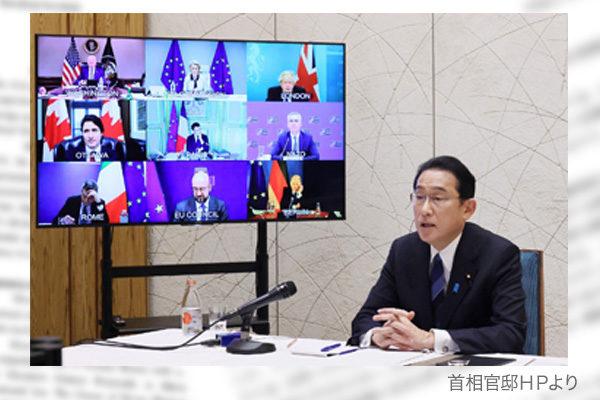We Japanese should remember the scene of a country’s national sovereignty being trampled by another country’s use of force. As China is increasing military pressure in Asia, today’s Ukraine could be tomorrow’s Japan.
In eight years after losing the Crimean Peninsula to Russia, Ukraine increased force size to about 260,000 and enhanced defense equipment. Even so, however, Ukraine has failed to deter Russian President Vladimir Putin from invading Ukraine. Ukrainian President Volodymyr Zelensky signed a decree to call up reserve forces only two days before the Russian invasion, indicating Ukraine’s insufficient intelligence gathering and analysis.
Looming threats from nuclear powers
Can Japan laugh at such Ukraine? Japan has been deprived by the former Soviet Union of the four northern islands that are Japan’s inherent territories. Japan’s Takeshima Islands have been illegally occupied by South Korea. China Coast Guard ships have repeated their intrusion into Japan’s territorial waters around the Senkaku Islands.
Japan has long been little conscious of national defense. Incumbent Japanese Prime Minister Fumio Kishida is the ninth head of the ruling Liberal Democratic Party’s Kochikai group, a dovish faction that led the policy of developing Japan into a “lightly armed, economically powerful” country during the period of rapid economic growth.
Elected from Hiroshima known as the first atom-bombed city in the world, Prime Minister Kishida holds fast to the slogan of nuclear abolition. Russian President Vladimir Putin has taken advantage of Russia’s nuclear alert to threaten Ukraine and the West. Ukrainian Foreign Minister Dmytro Kuleba told a U.S. FOX News program that Ukraine’s decision to abandon nuclear weapons in 1994 was not wise. How would Kishida take this remark? It is good to set out nuclear abolition as an ultimate goal, but the time has come for Japan to seriously consider how to take advantage of the deterrence effects of nuclear weapons.
Japan has sea borders with nuclear powers Russia and China. Shinzo Abe, when serving as prime minister, accumulated negotiations with President Putin in an attempt to separate Russia from China to avoid any simultaneous face-off with the two nuclear powers, but the attempt ended up unsuccessful.
The number of Air Self-Defense Force fighter aircraft’s scrambles to check Chinese and Russian military aircraft’s intrusion into Japan’s air defense identification zone soared nearly five-fold from 26 in May to 127 in November last year. In addition, a rising number of Chinese and Russian military ships passed through waters near Japan. Particularly, China and Russia conspicuously conducted their joint flights and navigations around Japan, indicating their increasing military cooperation in Asia.
Military buildup required to defend Japan
It is natural for Japan to further enhance cooperation with its only ally the United States, but that is not enough. Given the United States’ flagging prestige, what Japan should do is clear. Japan should amend its constitution, which bans Japan’s possession of any war potential and denies its right of belligerency, and should build up defense capabilities.
Japan should not only increase defense spending substantially but also deploy intermediate-range missiles for attacking enemy land to deter aggression.
Nothing other than armed forces can persuade those that believe in armed forces.
Takashi Arimoto is a Planning Committee member at the Japan Institute for National Fundamentals and publisher of Monthly Magazine SEIRON at the Sankei Shimbun newspaper.


